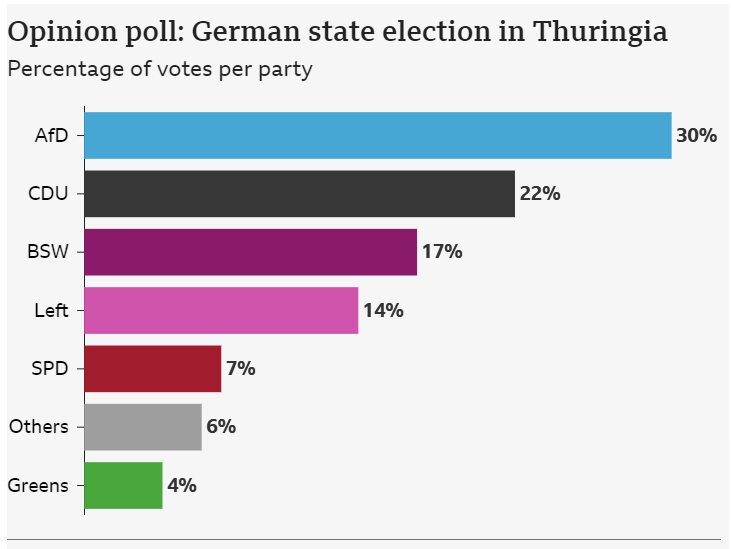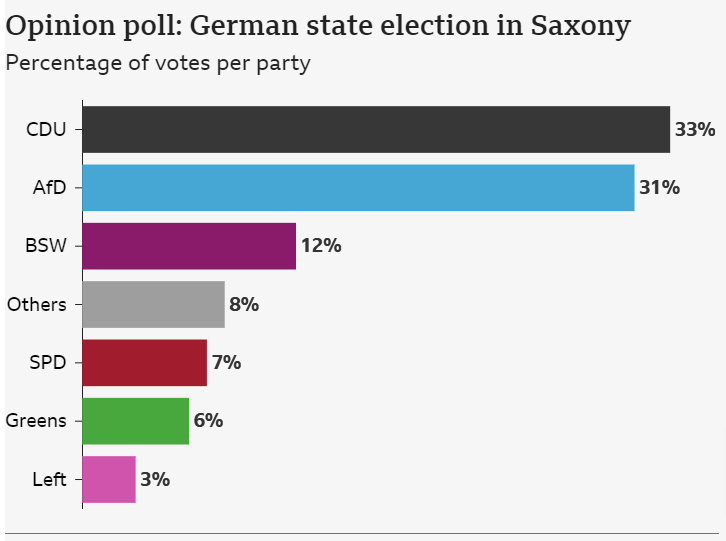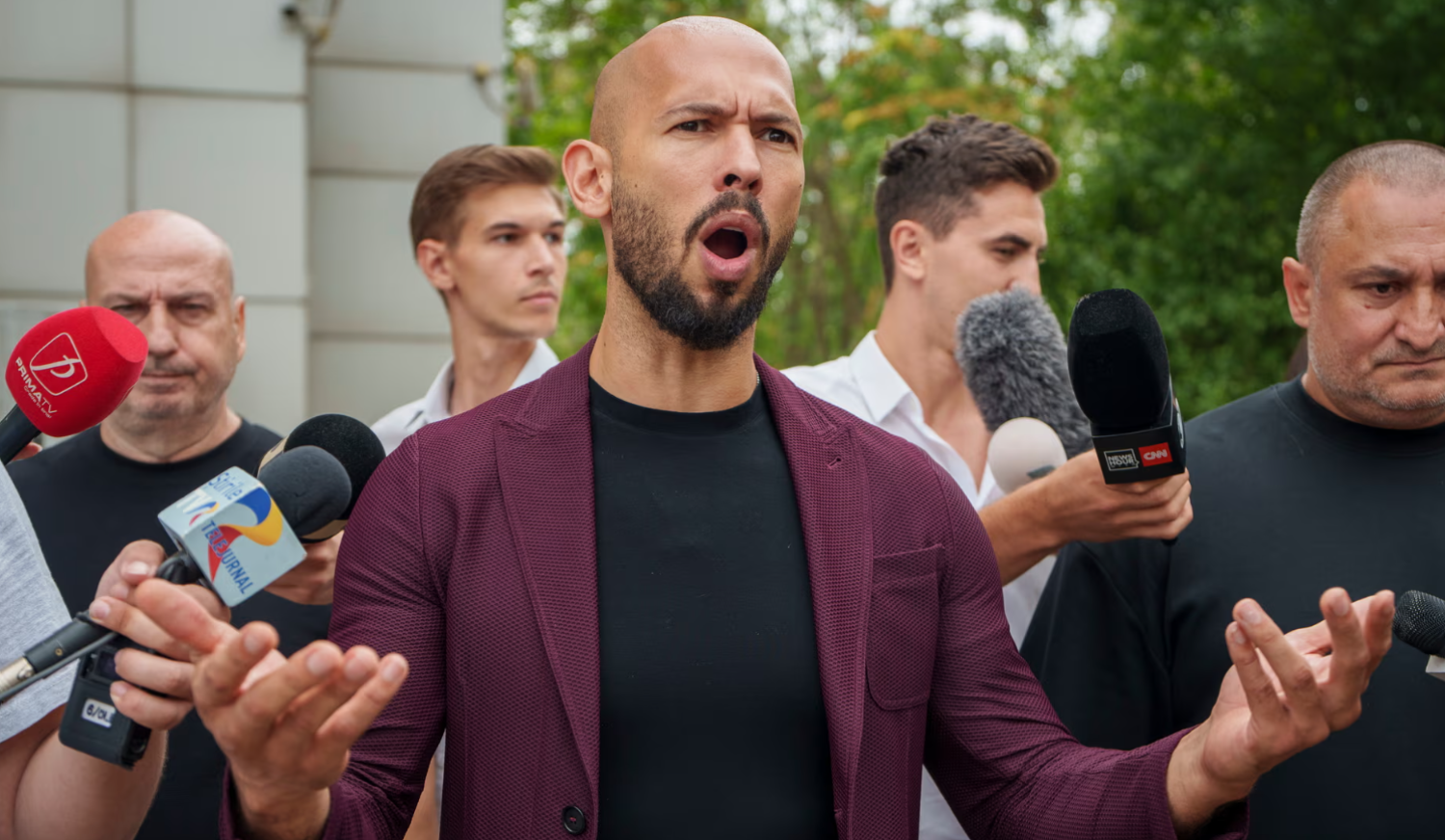-
Posts
10,801 -
Joined
-
Last visited
Content Type
Events
Forums
Downloads
Quizzes
Gallery
Blogs
Everything posted by Social Media
-
Germany stands on the brink of a political upheaval as the far-right Alternative for Germany (AfD) party inches closer to winning the most votes in state elections, a prospect that hasn’t occurred since the Nazi era. For many in Germany, the AfD’s rise feels like a haunting echo of the past, but for others, especially in the eastern regions, the party symbolizes a chance for change. The political atmosphere in Germany has been growing increasingly tense, and the upcoming state elections in Thuringia and Saxony could mark a boiling point. In Thuringia, during a recent visit by Chancellor Olaf Scholz, tensions were palpable. A small group in the crowd hurled insults, calling Scholz a “Liar!” while chants of “Volksverräter,” meaning “traitor of the people”—a phrase with deeply troubling Nazi associations—punctuated the atmosphere. Scholz’s Social Democratic Party, alongside its Green and Liberal coalition partners, is faring so poorly in Thuringia that they may not secure a single seat in the state parliament. Meanwhile, the AfD is leading in the polls, and in neighboring Saxony, it is neck and neck with the conservative CDU. A recent knife attack, allegedly carried out by a Syrian asylum seeker and suspected Islamist, which resulted in the deaths of three people, has intensified public anger about migration policies. The government’s hasty response included the announcement of tougher asylum and knife crime laws, but these measures are unlikely to quell the broader discontent among AfD supporters, who feel their grievances go beyond immigration issues. They also express frustration with what they view as extreme green policies, government interference, and controversial military support for Ukraine. In eastern Germany, these concerns are compounded by long-standing feelings of neglect and resentment dating back to reunification. Many in the east feel that their region has been overlooked, struggling with weaker industries, lower wages, and pension inequalities compared to the west. Sixteen-year-old Constantin, who commutes on his old East German Simson S50 moped, captures this sentiment: “The east and the west, it’s true it’s connected now. It’s one Germany. But we see, in the difference, it’s big.” His words echo the frustration of many in the former communist GDR who feel marginalized. Constantin and many of his peers strongly support the AfD and dismiss accusations of extremism against the party. Despite investigations linking the AfD to extremist networks, its supporters often claim that both the media and state intelligence agencies are biased against them. In Thuringia, the AfD is officially classified as right-wing extremist, and its leader, Björn Höcke, was recently fined for allegedly using a Nazi slogan, though he denies doing so intentionally. For many easterners, who recall the oppressive surveillance of the Stasi during the communist era, there is a deeply rooted suspicion of state interference. Vivien Rottstedt, a 31-year-old lawyer and AfD candidate in Thuringia, believes that the restrictive measures during the COVID-19 pandemic and what she perceives as enforced “politically correct” viewpoints have only deepened public mistrust. “The people who live here have already experienced what it is like when the government starts to interfere too much,” she says, sheltering from the sun under a campaign umbrella. “People from eastern Germany know exactly what it’s like when you’re no longer allowed to express your own opinion.” Amid this political upheaval, another insurgent party, the Sahra Wagenknecht Alliance (BSW), has also surged in the polls, ranking third in Thuringia. Led by former communist Sahra Wagenknecht, the BSW blends cultural conservatism with left-wing economic policies. However, it is the AfD that poses the greatest challenge, with a strong likelihood of securing the most votes in Thuringia, Saxony, and later this month in Brandenburg. Although the AfD is unlikely to gain power due to other parties’ efforts to unite against it, its growing popularity underscores the severe challenges facing Chancellor Scholz and his troubled coalition. The upcoming elections are more than just regional contests—they are a crucial barometer of public opinion as Germany approaches its federal elections, where the chances of the current coalition’s survival appear increasingly slim. The CDU, under Friedrich Merz, looks poised to challenge for the chancellery, adopting a more right-leaning stance in a bid to counter the AfD’s growing influence. Credit: BBC 2024-08-31 Get the ASEAN NOW daily NEWSLETTER - Click HERE to subscribe
-
Ukraine has called on Mongolia to arrest Russian President Vladimir Putin ahead of his upcoming visit to the country, marking the first time he will travel to an International Criminal Court (ICC) member state since the court issued a warrant for his arrest. The ICC accuses Putin of war crimes, specifically citing his failure to prevent the unlawful deportation of Ukrainian children to Russia since the conflict began. An ICC spokesperson told the BBC that Mongolian officials "have the obligation" to adhere to ICC regulations. However, the spokesperson also clarified that this obligation does not necessarily mandate an arrest. The Kremlin has downplayed concerns over the visit, with spokesperson Dmitry Peskov stating, "We have an excellent rapport with our partners from Mongolia," and assured that "all aspects of the president’s visit have been carefully prepared." Dr. Fadi el-Abdallah, another spokesperson for the ICC, emphasized that as a party to the ICC, Mongolia is obligated to cooperate under Chapter IX of the Rome Statute, the agreement that established the court. While the agreement does allow for certain exceptions, such as breaching a treaty obligation with another state or violating diplomatic immunity, non-cooperation could lead ICC judges to make a formal finding and report it to the Assembly of States Parties. Dr. el-Abdallah added that it would then be up to the Assembly to decide on any further actions. The allegations against Putin, which also target Russia's commissioner for children's rights, Maria Lvova-Belova, stem from what the ICC describes as the unlawful deportation of children from Ukraine to Russia since the full-scale invasion began on February 24, 2022. Moscow has consistently denied these allegations, dismissing the warrants as "outrageous." Despite these serious accusations, the ICC lacks the power to arrest suspects on its own, relying instead on cooperation from its member states. Ukraine's foreign ministry expressed hope that Mongolia would recognize Putin as a "war criminal" and urged the country's authorities to detain the Russian leader and turn him over to ICC prosecutors at The Hague. The visit to Mongolia comes after Putin canceled a planned trip to a summit in South Africa last year following the ICC's issuance of the arrest warrant. As a signatory to the court, South Africa would have been obligated to arrest Putin if he had set foot on its soil. However, South African President Cyril Ramaphosa warned that such an action could be seen as a declaration of war by Russia, leading to a "mutual" decision for Putin to skip the summit. As the visit to Mongolia approaches, the world watches closely to see how the situation will unfold. The BBC has reached out to the Mongolian Embassy for further comment, but the outcome remains uncertain. Credit: CNN 2024-08-31 Get the ASEAN NOW daily NEWSLETTER - Click HERE to subscribe
-

Pattaya Airways’ maiden flight set to revolutionise Thai logistics
Social Media replied to snoop1130's topic in Thailand News
A not funny animated meme of a plane crash removed -
The United States has extended an offer to the Philippines to escort its supply ships to outposts in the highly disputed South China Sea, as confirmed by the Philippine military chief on Thursday. This comes in response to China's escalating efforts to block these vital resupply missions. General Romeo Brawner, head of the Philippine military, acknowledged the offer but stated that it would only be considered if the situation reached a critical point where life-saving provisions could not be delivered, and troops were left in dire straits. "We're happy that the US has given us a range of options including that of joining or escorting us for the ROREs (rotation and resupply missions)," Brawner said at a press conference following his meeting with Admiral Samuel Paparo, the US Indo-Pacific Commander, in Baguio City. The admiral reiterated US readiness to assist but did not provide further details on what that involvement would entail. "We stand ready," Paparo briefly remarked. In recent months, there has been a marked increase in tensions and clashes between Philippine and Chinese vessels during resupply missions to Filipino troops, coast guard personnel, and local fishermen stationed at strategic outposts, including Second Thomas, Sabina, and Scarborough Shoals. Despite an international ruling that invalidates Beijing's claims, China continues to assert control over the majority of the South China Sea. China justifies its actions against Philippine vessels as lawful and proportionate, a stance that has only intensified the already volatile situation. In one of the latest incidents, Philippine and Chinese vessels collided twice near Sabina Shoal, where the Philippine Coast Guard has anchored a ship in a bid to prevent China from seizing the ring of reefs. This region has been a hotbed of confrontation as both nations vie for control, each asserting their own claims over these waters. The gravity of the situation was underscored in June when a Filipino sailor lost a thumb in a confrontation at Second Thomas Shoal. The incident saw Chinese coast guard members wielding knives, sticks, and an axe to thwart a Philippine Navy resupply attempt, escalating the physical and diplomatic tensions between the two countries. These clashes have raised serious concerns that the United States, bound by a mutual defense treaty with the Philippines, could be pulled into an armed conflict with China. The potential for such an escalation underscores the delicate balance of power in the region, where any miscalculation could have far-reaching consequences. Both Washington and Manila have engaged in discussions exploring options to ensure the continued resupply of Filipino personnel, even as Chinese ships maintain a strong presence in the contested waters. General Brawner emphasized that for the time being, the Philippines will continue its resupply missions independently. "If nothing works, then that's the time we can ask for help," Brawner explained, indicating that the Philippines has not yet exhausted its available options. He cited recent successful efforts, such as using a helicopter to deliver supplies to the BRP Teresa Magbanua, a Philippine Coast Guard ship that has been anchored at Sabina Shoal since April to deter Chinese attempts to seize it. During a briefing in Manila, Admiral Paparo reiterated that the US stands ready to support its ally. "The escort of one vessel is an entirely reasonable option within our Mutual Defence Treaty," he noted, signaling the potential for a more direct US involvement if the situation deteriorates further. However, the prospect of US intervention remains a sensitive and complex issue, with potential implications for broader geopolitical stability in the Asia-Pacific region. As the standoff continues, the situation remains precarious, with the Philippines striving to maintain its sovereignty and supply lines without triggering a larger conflict. The offer from the United States represents a significant gesture of support, highlighting the enduring alliance between the two nations. However, both sides seem acutely aware of the risks associated with any further escalation, as they navigate the treacherous waters of the South China Sea. Credit: RFI 2024-08-31 Get the ASEAN NOW daily NEWSLETTER - Click HERE to subscribe
-
The U.S. Air Force recently surprised many by reconsidering its ambitious plan to develop a sixth-generation stealth fighter, a project estimated to cost around $60 billion. This new jet, known as the Next-Generation Air-Dominance (NGAD) fighter, was intended to replace the aging fleet of F-22 Raptors, widely regarded as the world’s most advanced fighter jets. Although the F-22, which debuted in the 2000s, remains unmatched in terms of stealth and combat capabilities, its time is running out, and the Air Force needs to plan for the future. The NGAD program was expected to deliver around 200 advanced fighters, each costing about $300 million, which is three times the price of the current F-35 Lightning II. The hefty price tag reflects the jet’s cutting-edge technology, designed for long-range missions over the Pacific Ocean, where U.S. air bases could be separated by vast distances. Current fighter jets like the F-15, F-16, F-22, and F-35 have limited ranges, making them reliant on aerial refueling—a vulnerability that could be exploited in conflict with China. General David Allvin, the Air Force’s chief of staff, was the first to express doubts about the NGAD program, suggesting that the design might not be the right fit. Air Force Secretary Frank Kendall echoed this sentiment, indicating that the Air Force is exploring cheaper alternatives. “We’re looking at whether we can do something that’s less expensive and do some trade-offs there,” said Kendall, highlighting a shift in focus toward affordability. The primary appeal of the NGAD was its long range, facilitated by large fuel tanks and next-generation adaptive engines designed for high efficiency. The fighter was envisioned to have a range nearly double that of the F-22, enabling it to reach critical areas like Taiwan and the first island chain stretching from Japan to the Philippines without depending heavily on tankers. However, the rising costs have made Air Force leaders reconsider this strategy. In July, Allvin presented a concept for a smaller, lighter stealth fighter that might be easier and cheaper to produce. This hypothetical aircraft resembles the F-35 but is even smaller, with a single engine and potentially lacking the advanced adaptive technology that drove up NGAD’s costs. While cheaper and adaptable to new technologies, a lighter fighter would sacrifice the long range needed for operations in the Pacific, possibly forcing the Air Force to rethink its combat approach. This reconsideration has led to uncertainty about the future of the NGAD program. There is no guarantee that the Air Force will fully abandon the NGAD, nor is it clear if the conceptual light fighter will ever be realized. If it does replace the NGAD, the Air Force might have to adjust its strategy in a potential Pacific conflict, relying more on bombers and missiles rather than direct aerial combat over Taiwan. One potential approach involves using stealth bombers to launch cruise missiles from bases far removed from the immediate combat zones, effectively avoiding direct confrontations with Chinese fighters. This strategy could be a game-changer, emphasizing missile strikes from a distance rather than traditional dogfights. In January 2023, a war game simulation by the Center for Strategic and International Studies (CSIS) demonstrated this tactic’s potential effectiveness. In these scenarios, Chinese missile strikes decimated U.S. bases, forcing American forces to operate from great distances. Yet, with the help of long-range bombers and U.S. Navy submarines, the Chinese invasion fleet was successfully neutralized. These simulations suggest that the Air Force’s focus on finding the perfect fighter jet—whether the NGAD or a lighter alternative—may not be the critical factor in a future war with China. “In most of the simulations, Chinese missiles devastated US bases across the region, compelling the Air Force to launch bombers from thousands of miles away,” the CSIS report notes. In these war games, American fighters often never left the ground, and missiles, rather than jets, played the decisive role. As the Air Force continues to weigh its options, it faces a complex decision: invest in an expensive long-range fighter or pivot to a more economical, short-range option that reshapes its approach to warfare. The outcome could significantly impact U.S. air strategy in the Pacific, where the ability to adapt to evolving threats will be just as crucial as the capabilities of any single aircraft. Credit: Daily Telegraph 2024-08-31 Get the ASEAN NOW daily NEWSLETTER - Click HERE to subscribe
-
A Spanish police patrol boat collided with a speedboat believed to be carrying migrants attempting to reach Spanish soil. The event, captured on video, has drawn widespread attention and sparked a heated debate over the actions of the Spanish authorities. Moroccan authorities have announced that they are conducting an investigation into the collision, seeking to determine the circumstances that led to such a dangerous and potentially deadly encounter. However, Spain’s interior ministry has stated that it does not plan to pursue an investigation into the incident, further fueling the controversy. The situation has brought renewed attention to the ongoing challenges faced by migrants attempting to reach Europe, particularly through the Spanish enclaves of Melilla and Ceuta. These two small territories on Morocco’s Mediterranean coast represent the only land borders between the European Union and Africa, making them focal points for those desperate to enter Europe. The enclaves sporadically experience waves of attempted crossings, often involving migrants who risk their lives to reach European soil. Authorities in Morocco have indicated that the vast majority of attempts to smuggle migrants by boat into Melilla and Ceuta are organized by traffickers based in the Spanish cities. These traffickers exploit the vulnerability of migrants, charging exorbitant fees for the perilous journey across the Mediterranean. The collision has underscored the dangerous and often tragic reality faced by those attempting to migrate to Europe. While the four individuals involved in this particular incident were fortunate to survive, many others have not been so lucky. The Mediterranean has long been a treacherous route for migrants, with countless lives lost in the pursuit of safety and a better future. As the debate over the incident continues, it highlights the broader challenges faced by European governments in balancing border security with humanitarian concerns. The actions of the Guardia Civil in this case have been met with both support and condemnation, reflecting the complex and often contentious nature of immigration enforcement in the region. The call for an official explanation from Spain's interior minister reflects the deep unease felt by many over the handling of the situation. For those advocating for migrant rights, the incident serves as a stark reminder of the dangers faced by those seeking to enter Europe and the need for policies that prioritize human dignity and safety. As investigations continue and political pressure mounts, the incident off the coast of Melilla is likely to remain a focal point in the ongoing debate over immigration and border control in Europe. The collision, while just one event in a much larger and complex issue, has highlighted the urgent need for solutions that address both the security concerns of nations and the humanitarian needs of individuals fleeing conflict, persecution, and poverty. Credit: Daily Telegraph 2024-08-31 Get the ASEAN NOW daily NEWSLETTER - Click HERE to subscribe
-
A fire in a tower block in Dagenham, east London, has sparked outrage among residents who claim they were trapped behind locked gates during the blaze. Video footage obtained by Sky News shows terrified residents trying to escape, only to find their route blocked. The fire broke out in the early hours of Monday morning, leading to the evacuation of over 80 people, with two residents hospitalized. As flames engulfed the building, a video from inside captured the panic and frustration of those trapped, with one person shouting, "open the f*****g gate." In response to the incident, Dagenham Council has pledged to support affected residents by providing emergency housing and pressing Block Management UK Ltd, the company responsible for managing the building, to fulfill its obligations. “We will continue to press Block Management UK Ltd to meet their obligations to residents. We will also look to recover costs from responsible parties,” a council spokesperson said. However, Block Management has not yet commented on the incident or the accusations of negligence. The Dagenham fire serves as a grim reminder of the potential consequences of inadequate fire safety measures and poor building management. Residents, who had long warned of the dangers, are now left grappling with the aftermath of a fire that could have been even more catastrophic. The locked fire escape gate and failed alarm system not only highlight critical lapses in safety protocols but also raise urgent questions about the oversight and accountability of those responsible for maintaining residential buildings. The incident has fueled growing frustration among Londoners, particularly in the wake of previous tragedies like Grenfell Tower, where safety failures led to devastating loss of life. With thousands of buildings still needing urgent safety upgrades, the Dagenham fire is a stark reminder of the ongoing battle to ensure that all residents have access to safe living conditions. As investigations continue, residents and the wider public will be watching closely to see if meaningful action is taken to prevent such incidents from occurring again. Credit: Sky News 2024-08-31 Get the ASEAN NOW daily NEWSLETTER - Click HERE to subscribe
-
In his latest book, "Save America," former President Donald Trump once again stokes rumors about the parentage of Canadian Prime Minister Justin Trudeau, suggesting that Fidel Castro could be his father. This controversial claim, which has circulated in various forms over the years, is now being repeated by Trump, who has a history of promoting sensational and unsubstantiated stories. The former president has recently put this rumor in print, following a similar assertion he made during a podcast interview, where he said, "they say he's the son of Fidel Castro, and could be." In his book, Trump doubles down on this claim, despite it being thoroughly debunked in the past. The Canadian government denied the rumor in 2018, and a fact-check by the Associated Press revealed that Justin Trudeau was born four years before his mother, Margaret Trudeau, made her first trip to Cuba. Trump’s book, described as a coffee table tome featuring pictures from his time in office, includes captions that stir up various controversial moments and stories. In one excerpt obtained by DailyMail.com, Trump writes, "Justin Trudeau and I got along very well, but there were natural differences in that he is very Liberal, and I, to put it mildly, am not. It will be very interesting to see how we do in the future, but first, I have to get there (back to the White House)." The former president goes on to reference Margaret Trudeau, the mother of Justin Trudeau, describing her as "beautiful and wild." He writes, "In the 1970s, she would go ‘clubbing’ with the Rolling Stones, but she was also somehow associated with Fidel Castro. She said he was ‘the sexiest man I’ve ever met,’ and a lot of people say that Justin is his son. He swears that he isn’t, but how the hell would he know! Castro had good hair, the ‘father’ didn’t, Justin has good hair, and has become a Communist just like Castro." This assertion is not new; it gained traction online after Justin Trudeau praised Castro as a "larger-than-life legendary revolutionary" following Castro’s death in 2016. However, the timeline and facts surrounding the birth of Justin Trudeau do not support the claim. Margaret Trudeau was 22 when she married Canadian Prime Minister Pierre Trudeau, who was 51 at the time. Justin was born nine months after their marriage in 1971, well before Margaret’s first documented trip to Cuba. Despite the lack of evidence, Trump has continued to push this narrative, using it as part of his broader strategy to critique and undermine leaders with whom he has ideological differences. The book "Save America" is filled with such provocative content, including a cover shot of Trump moments after an assassination attempt in Butler, Pennsylvania, and images of him during key moments of his presidency, such as the CNN presidential debate that Trump claims helped end President Joe Biden's reelection bid. Sergio Gor, the publisher of Winning Team Books, which released "Save America," expressed excitement over the book’s popularity. "We are thrilled by the demand we have seen for President Trump’s new book. We are trying to keep up and will be reprinting as soon as possible. No other book captures his historic journey in a beautiful coffee table book like SAVE AMERICA," Gor said. Trump’s tendency to revive and amplify controversial rumors is not limited to Trudeau. Former Trump White House Press Secretary Stephanie Grisham, who has since turned against Trump and spoke at the Democratic convention, recounted in her own book an incident where Trump made a crude remark about Trudeau’s mother. According to Grisham, while on Air Force One, Trump suddenly brought up Justin Trudeau, saying, "Trudeau's mom. She f***ed all of the Rolling Stones." Grisham recalled Trump asking her, "Are you OK if I say this?" before making the explicit statement. Trump's willingness to repeat these unfounded rumors, even in the face of clear evidence to the contrary, underscores his broader strategy of using sensationalism to capture attention and rally his base. As he prepares for a potential return to the White House, these tactics continue to define his approach to both politics and public discourse. The rumor surrounding Justin Trudeau’s parentage, like many of Trump’s assertions, plays into a larger narrative that the former president has cultivated—one where sensational claims are used to discredit political opponents and reinforce his standing among supporters. While these stories may captivate a certain audience, they also serve to polarize and provoke, ensuring that Trump remains a central figure in the ongoing political conversation. Credit: Daily Mail 2024-08-31 Get the ASEAN NOW daily NEWSLETTER - Click HERE to subscribe
-
As the transgender community continues to gain visibility and acceptance in many parts of society, a new set of challenges has emerged for its older members. With over 1.3 million transgender adults living in the United States, approximately 171,000 are aged 65 and older. Among them is Rajee Narinesingh, a 56-year-old actress and activist from Florida. Having faced significant struggles throughout her life, from workplace discrimination to the devastating effects of black market injections that scarred her face, Narinesingh has nonetheless witnessed growing acceptance over the years. “If you see older transgender people, it shows the younger community that it’s possible I can have a life. I can live to an older age,” Narinesingh reflects. “So I think that’s a very important thing.” However, despite the progress, she now faces new uncertainties about her future, particularly as a wave of new state laws enacted this year limits transgender people’s rights. “Every now and then I have like this thought, like, oh my God, if I end up in a nursing home, how are they going to treat me?” she worries. While most of the new state laws have focused on trans youth—at least 22 states have banned or restricted gender-affirming care for minors—the impact on transgender seniors is significant. For many, these laws have instilled new fears about retirement and old age, particularly regarding access to health care and the availability of welcoming spaces to live. Morgan Mayfaire, a transgender man and the executive director of TransSOCIAL, a Florida-based support and advocacy group, voices similar concerns. “I have friends that have retired and they’ve decided to move to retirement communities. And then, little by little, they’ve found that they’re not welcome there,” Mayfaire shares. Discrimination in these settings can manifest in various ways, from being denied housing to being misgendered and facing challenges in having their visitation rights acknowledged. “In order to be welcome there, they have to go into the closet and deny who they are,” Mayfaire says. The numbers speak to a growing population: about 171,000 transgender adults in the United States are aged 65 and older, according to the Williams Institute at the UCLA School of Law. However, while this population is increasing, the services available to them remain limited. Facilities geared toward serving the LGBTQ+ community, such as nursing homes and assisted living centers, are still uncommon. One example of such a facility is Stonewall Gardens, a 24-apartment assisted living center in Palm Springs, California, which opened in 2015. The center’s staff undergo sensitivity training to ensure the environment is welcoming and comfortable for transgender residents. “Do you really want to be moving into a place where you have to explain yourself and have to go through it over and over?” asks interim executive director Lauren Kabakoff Vincent. “It’s exhausting, and so I think being able to be in a comfortable environment is important.” SAGE, an organization advocating on behalf of LGBTQ+ seniors, offers training to nursing homes and other elder care providers. In the most recent fiscal year, they trained more than 46,000 staff at 576 organizations across the country. However, this still represents just a fraction of the elder care facilities nationwide. “We have a long way to go in terms of getting to the point where nursing homes, assisted living, and other long-term care providers are prepared for and ready to provide appropriate and welcoming care to trans elders,” says Michael Adams, SAGE’s CEO. The gap in services and acceptance is a cause for concern for many, including Tiffany Arieagus, a 71-year-old drag performer and social services worker in south Florida. Arieagus, who works with SunServe, an LGBTQ+ nonprofit, has witnessed many changes over her lifetime, from marching in civil rights demonstrations as a child to advocating for gay rights. “I just am going on my 71 years on this earth and walking in the civil rights march with my mother at age six and then marching for gay rights,” she recounts. “I’ve been blessed enough to see so many changes being made in the world. And then now I’m having to see these wonderful progressions going backwards.” While states like Massachusetts and California have enacted laws to ensure that LGBTQ+ seniors have equal access to aging programs and require training on how to serve this community, the push for restrictions on access to health care in other states has introduced new uncertainties. In Florida, the ban on gender-affirming care for minors also includes provisions that make it challenging for many adults to receive treatment. SAGE has seen a significant increase in the number of calls to its hotline following the wave of anti-transgender legislation. According to Adams, about 40% of these calls have come from trans seniors, primarily in conservative parts of the country, who are worried about the new restrictions. For some transgender adults, these laws have prompted them to leave the state in search of care, often turning to crowdfunding for help. However, for many trans seniors, such a move isn’t feasible. “You have the general fear, fear that is leading clinicians being concerned and perhaps stepping away from offering care, fear of trans elders of who is a safe clinician to go to,” explains Dan Stewart, associate director of the Human Rights Campaign’s Aging Equality Project. One such individual facing these obstacles is Andrea Montanez, a 57-year-old LGBTQ immigration organizer at Hope CommUnity Center near Orlando. After the restrictions were signed into law, Montanez’s prescription for hormone therapy was initially denied. Although she was eventually able to get her prescription filled, Montanez remains concerned about the future as she approaches retirement. “I hope I have a happy retirement, but health care is a big problem,” she says. Tatiana Williams, 51, the executive director of the Transinclusive Group in Wilton Manors, Florida, is also troubled by the new restrictions. For her, they bring back painful memories of a time when she and other transgender individuals had to rely on dangerous and illegal sources for gender-affirming care. Williams recalls being hospitalized for a collapsed lung after receiving black market silicone injections for her breasts. “What we don’t want is the community resorting to going back to that,” she warns. Despite the challenges, there is a sense of resilience among older transgender adults. They see hope in the way their generation is working with younger trans people to push back against the wave of restrictive laws. “The community’s going to take care of itself. It’s as simple as that. We’re going to find ways to take care of ourselves and we’re going to survive this,” Mayfaire asserts. “And as far as trans youth panicking over this, look to your elders.” This sense of solidarity and determination underscores the strength of the transgender community, even in the face of adversity. As older transgender adults navigate these uncertain times, they continue to inspire younger generations by showing that it is possible to live a full and meaningful life, despite the obstacles. The fight for acceptance and equality may be ongoing, but the courage and resilience of those who have come before will undoubtedly light the way forward. Credit: NBC News 2024-08-31 Get the ASEAN NOW daily NEWSLETTER - Click HERE to subscribe
-
Former President Donald Trump has expressed opposition to the six-week abortion ban recently enacted in Florida, a state he now calls home. However, despite his disagreement with the legislation, he has not committed to voting for the ballot measure that seeks to overturn the restriction. In a television interview on Thursday, Trump remarked that the six-week ban is too restrictive and hinted at his support for a November ballot initiative that could repeal the law, which was championed by his former ally, Governor Ron DeSantis, and the Florida Republican Party. In contrast, Natasha Sutherland, spokesperson for the Amendment 4 campaign, highlighted the nonpartisan nature of the issue, arguing that Floridians across the political spectrum support the measure. “We know that the passage of Amendment 4 is a nonpartisan issue—Republican, Democrat, or independent, the overwhelming majority of Floridians do not want the government making decisions for them when it comes to something as personal and complicated as pregnancy,” Sutherland wrote. She pointed to the risks faced by doctors and the challenges for women in need of life-saving care as evidence of the amendment’s necessity. Trump’s evolving stance on abortion is part of a broader strategy to position himself as a more moderate figure on reproductive rights, while still appealing to his conservative base. As part of this effort, he has also sought to portray himself as a strong advocate for in-vitro fertilization (IVF), a procedure that has come under scrutiny in some conservative circles. In February, the Alabama Supreme Court ruled that embryos frozen during IVF could be considered children, a decision that raised concerns among Republicans about the potential legal implications for the widely used fertility treatment. At a rally in Michigan on Thursday, Trump pledged that his administration would support making IVF treatment free, though he did not provide specific details on how this would be accomplished. “Your government will pay for, or your insurance company will be mandated to pay for, all costs associated with IVF treatment because we want more babies, to put it very nicely,” Trump declared. He also promised that new parents would be allowed to deduct significant newborn expenses from their taxes. Meanwhile, the Biden administration, represented by Vice President Kamala Harris’ campaign, has been quick to criticize Trump’s attempts to reframe his position on reproductive rights. Harris’ spokesperson, Sarafina Chitika, dismissed Trump’s recent comments, pointing out the contradiction between his role in overturning Roe v. Wade and his current rhetoric. “Trump lies as much, if not more, than he breathes, but voters aren’t stupid,” Chitika said in a statement. “Because Trump overturned Roe v. Wade, IVF is already under attack, and women’s freedoms have been ripped away in states across the country.” Trump’s approach to the abortion debate and reproductive rights reflects his ongoing challenge of balancing the expectations of his conservative base with the broader electorate’s views. As he navigates this complex political landscape, his comments and actions will likely continue to shape the discourse on these critical issues in the lead-up to the 2024 election. Credit: Politico 2024-08-31 Get the ASEAN NOW daily NEWSLETTER - Click HERE to subscribe
-
The UK government's recent announcement to tackle extreme misogyny as part of its anti-extremism strategy has sparked intense debate. Critics argue that anti-extremism policies have historically been ineffective, and adding misogyny into the mix is unlikely to bring about significant change. The recent riots in the UK, triggered by a knife attack in Southport, underscored the complex ways in which misogyny intersects with far-right ideology. One prominent figure who fueled misinformation during the unrest was Andrew Tate, a self-proclaimed misogynist influencer. In the aftermath of the attack, Tate falsely claimed that the perpetrator was “an illegal immigrant arrived on a boat one month ago,” highlighting the dangerous ways in which extremist views spread across different online communities. Tate’s influence illustrates a broader trend: individuals known for peddling one form of outrage, such as misogyny, often branch out into other forms of extremism to capture new audiences. This cross-pollination of ideas, especially during major events that draw public attention, has changed how extremist ideologies are disseminated online. The way hard-right groups organize today is vastly different from just seven years ago, the last time the UK government reviewed its counter-extremism strategy. In response to these evolving threats, the current government has commissioned a rapid policy review to assess not only the rise of Islamist and hard-right ideologies but also new trends, including extreme misogyny. While the announcement by Home Secretary Yvette Cooper grabbed headlines, the practical implications of defining misogyny as extremism remain murky. Key questions linger: would expressing misogynist views be grounds for referral to Channel, the UK’s secretive deradicalisation program? Would police be alerted if misogynistic views were expressed, or would intervention only occur when violent intent was evident? This uncertainty is compounded by the fact that misogyny is alarmingly widespread. Determining when misogyny crosses into extremism poses a significant challenge. Would a police officer sharing inappropriate photos of a woman or making derogatory remarks about female colleagues be deemed an extremist? Or what about a judge whose lenient sentencing reflects a bias toward the male perpetrator in a sexual assault case? Home Office Minister Jess Phillips attempted to address concerns about free speech, suggesting that the same standards used to identify far-right extremism or Islamist radicalism would apply to extreme misogyny. “You just use the exact same test you would with far-right extremism and Islamism, wouldn’t you? The same test would have to apply,” Phillips stated on LBC. However, the history of UK counter-extremism policy reveals a lack of a clear and consistent test. The question of what constitutes an extreme idea and when state intervention is warranted has long been contentious. The Preventing Violent Extremism scheme, launched in 2007 in the wake of the 2005 London bombings, initially focused on preventing acts of violence by countering harmful ideologies. However, subsequent reviews shifted the emphasis from just violent extremism to combating all forms of extremism. Unlike some countries that view disengagement from violence as sufficient, the UK’s Prevent strategy aims for a complete rejection of extremist ideas. The 2015 relaunch further solidified the focus on extreme ideas rather than just the risk of violence. Former Prime Minister David Cameron encapsulated this shift, stating in 2015, “For too long, we have been a passively tolerant society, saying to our citizens: as long as you obey the law, we will leave you alone.” This approach raises fundamental questions about the role of government in regulating ideas, particularly when those ideas do not necessarily break the law. Over the years, the consensus has leaned toward the belief that the state should indeed intervene, moving beyond prohibiting hate speech and incitement to violence to identifying and curtailing unacceptable ideologies. Most people would agree that a society in which anti-egalitarian or bigoted views are prevalent is undesirable. Yet, the challenge lies in defining which views are intolerable and determining the degree of extremity that warrants state action. Extremism is often measured by its divergence from mainstream opinion, making it a fluid and subjective concept. Even if one accepts the argument that the government should combat dangerous ideas, defining and effectively countering these diffuse, widely held beliefs remains a core issue. One of the major criticisms of the Prevent strategy is the low threshold for referrals. The 2015 update to the strategy made it a statutory duty for teachers, doctors, and other public sector workers to report signs of extremism. This mandate has been widely criticized by human rights organizations, which argue that it has created a chilling effect, particularly among Muslim communities. Many feel less free to express their views, even on topics like British foreign policy, for fear of being reported. Amnesty International’s 2023 report on Prevent, titled *This is the Thought Police*, condemned the program for eroding basic human rights and curbing individuals’ freedoms based on little more than a “gut feeling.” It is easier for politicians to advocate for countering “hateful beliefs” than to address the underlying causes of these beliefs. Since Prevent’s inception, the UK has faced economic stagnation, declining living standards, and cuts to public services. Community support programs that once helped promote social cohesion have largely disappeared. Thus, announcing new counter-extremism measures becomes a cheaper, quicker way for the government to appear proactive without tackling the deeper structural issues that drive people toward extreme ideologies. Yet this strategy is not without risks. Women’s Aid, a prominent charity, has expressed concerns that gender-based abuse may be sidelined within a highly politicized counter-extremism framework. “If we are to overcome gender-based abuse, past approaches to deradicalisation by previous governments have left us cautious and concerned,” the charity warned, emphasizing the potential pitfalls of merging these issues. If, as Cooper suggests, extremism has grown in recent years, it signals that the current strategies are not working. Adding misogyny into the equation without reevaluating the effectiveness of existing approaches is unlikely to produce different results. The core problem lies not just in identifying and categorizing dangerous ideas but in understanding and addressing the broader social and economic conditions that allow such ideologies to flourish. Without a clearer, more nuanced approach, attempts to fight ‘extreme misogyny’ like terrorism risk repeating the same mistakes of past counter-extremism policies—sweeping gestures that do little to solve the underlying problems. Credit: The Guardian 2024-08-31 Get the ASEAN NOW daily NEWSLETTER - Click HERE to subscribe
-
Donald Trump has once again found himself at the center of controversy after reposting a misogynistic comment about Vice President Kamala Harris on his Truth Social platform. The post, which revived his pattern of sexist behavior, drew criticism not only from Democrats but also from within his own party, where strategists have urged him to focus on key issues rather than personal attacks. As recent polls show Harris gaining momentum, particularly among women voters, Trump chose to share a vulgar post that insinuated Harris’s political success was linked to sexual favors. The post, originally made by another user, featured photos of Harris alongside Hillary Clinton and commented, "Funny how blowjobs impacted both their careers differently…" The comment referenced rumors about Harris’s past relationship with Willie Brown, former mayor of San Francisco, while the mention of Clinton alluded to the Monica Lewinsky scandal that nearly ended Bill Clinton's presidency. This isn’t the first time Trump has targeted Harris with lewd references. Earlier in August, he shared a video by the Dilley Meme Team, a rightwing group, which included a parody of Alanis Morissette’s song "Ironic," with the line, “She spent her whole damn life down on her knees,” accompanied by images of Harris, her husband Doug Emhoff, and Willie Brown. The latest post was part of a series of extreme messages Trump shared on Wednesday, including endorsements of the QAnon conspiracy theory. He reposted, “WWG1WGA! RETRUTH IF YOU AGREE,” which is an acronym for the QAnon slogan, “where we go one, we go all.” Another post declared, “nothing can stop what is coming.” The FBI has identified theories like QAnon as potential threats that could incite domestic terrorism. In addition to these posts, Trump shared manipulated images of Bill Gates, Anthony Fauci, Joe Biden, and Nancy Pelosi in prison garb, further stoking division. The Harris campaign did not immediately respond to Trump’s latest social media outbursts. However, CNN host Anderson Cooper remarked that these posts took Trump’s campaigning to a “whole other level.” Cooper noted, “This is the Republican candidate for president and the 45th president of the United States, talking about two women who, no matter what you think of their politics, are two of the most accomplished women in American political history.” As Trump’s online activity intensified, a new Reuters/Ipsos poll showed Harris leading Trump by four points nationwide, with a notable 13-point lead among women voters. Additionally, a Fox News survey indicated Harris was gaining support in crucial southern Sun Belt states, leading by slim margins in Arizona, Georgia, and Nevada, while Trump held a narrow lead in North Carolina. Trump’s continued personal attacks have frustrated Republican strategists who have advised him to focus on issues like the economy, inflation, and immigration—topics they believe could resonate with swing voters. Jason Roe, a former executive director of the Michigan Republican Party, expressed the growing frustration within the GOP, stating, “I think people are incredibly frustrated. Harris’s campaign and policy stances give opportunities for the Trump campaign to talk about issues that actually will matter to swing voters. And rather than doing that, he’s delving into this nonsense.” Stuart Stevens, a strategist for Mitt Romney’s 2012 presidential bid and a member of the anti-Trump Lincoln Project, suggested that Trump’s approach could ultimately backfire, leading to a decisive victory for Harris. He told CNN, “There’s been a lot of talk—it’s sort of a universal truth—that this election is going to be close. I have a different opinion. I think it’ll be close till about October 20th, and then I think it’s going to be like Carter versus Reagan, that the bottom is going to start to drop out [of Trump’s campaign]. I think this is going to be a race that Democrats are going to win by more than Biden did.” Credit: The Guardian 2024-08-31 Get the ASEAN NOW daily NEWSLETTER - Click HERE to subscribe
-
Vice President Kamala Harris enters the 2024 presidential race with a distinct advantage: she is neither Joe Biden nor Donald Trump. Before Biden announced he would not seek reelection on July 21, the prospect of a rematch between the two aging political giants left voters uninspired. Americans craved an alternative, regardless of party lines. Harris’s candidacy brings a fresh dynamic, fueled by the element of surprise, the allure of change, Trump’s resistance to adapt, rapid Democratic unity, media support, and the possibility of reassembling the Obama-era coalition of hope and optimism. These factors have given Harris significant momentum that might carry her to victory on November 5. If current polling trends hold, Harris could narrowly win the election, leaving Trump on the losing side. But Trump never loses, or at least, he never admits to it. Should he lose, the aftermath would likely mirror the chaos of 2020, complete with wild claims of fraud, cheating, and election interference. Team Trump would flood the airwaves with accusations of a stolen election, judicial manipulation, and rigged voting machines, pushing legal battles potentially all the way to the Supreme Court. This spectacle would be closely watched by America’s adversaries, looking for signs of domestic instability and possible national security vulnerabilities. However, beyond the immediate fallout, a Trump loss would almost certainly trigger a civil war within the Republican Party. This conflict would pit Trump’s loyalists against those desperate to move beyond the Trump era and reclaim the White House in 2028 without a Trump on the ticket. For many within the GOP, Trumpism represents a political dead-end, characterized by a shrinking voter base and a tarnished brand. The transformation of the GOP into the “Trumplican Party” began in 2016. After Trump’s surprise victory, those Republicans who had supported other candidates were purged, resigned in protest, or reluctantly fell in line. Following Trump’s defeat in 2020, questioning his claims of victory or distancing oneself from his actions on January 6 became acts of disloyalty. Even supporting an alternative candidate in 2024 was seen as a betrayal. Trump’s dominance within the party is unparalleled in modern American politics, with his family firmly entrenched in GOP leadership. Lara Trump, his daughter-in-law and co-chair of the Republican National Committee, openly stated in February that “Every single penny will go to the number one and the only job of the RNC — that is electing Donald J. Trump as president of the United States.” This admission did not sit well with down-ballot candidates and party officials who felt sidelined by the family’s singular focus. If Trump were to lose to Harris, he would likely refuse to relinquish his hold on the party. Trump’s identity is inseparable from the Republican brand, unlike Biden, who has never been the singular face of the Democratic Party. Moving beyond the Trump era without a Trump family member would require a seismic shift within the GOP. Potential new leaders of a post-Trump GOP face a challenging landscape. Names like former UN Ambassador Nikki Haley, Florida Governor Ron DeSantis, and Senator Marco Rubio often surface, each envisioning themselves as the future of the party. Another rising star is Georgia Governor Brian Kemp, whose contentious history with Trump could empower him to lead a post-Trump GOP. But new leaders would also have to contend with entrenched Trump loyalists like Representatives Matt Gaetz and Marjorie Taylor Greene. Credit: Hill 2024-08-31 Get the ASEAN NOW daily NEWSLETTER - Click HERE to subscribe
-
Less than a year after gray wolves were reintroduced into the wild in Colorado, state officials are now taking steps to relocate the first breeding pack, known as the Copper Creek pack, following reports of livestock attacks. The decision, announced by Colorado Parks and Wildlife (CPW) on Tuesday, involves moving two of the 10 wolves originally released, along with the three pups they had this year. This move comes as a potential setback for Colorado’s ambitious reintroduction program, a contentious effort narrowly approved by a 2020 referendum. Marc Bekoff, a behavioral ecologist and professor emeritus of ecology and evolutionary biology at the University of Colorado, Boulder, warned that relocating the wolves could disrupt the pack’s stability. Bekoff explained that the wolves were originally taken from their home in Oregon and needed time to adapt to their new environment. He expressed concern that relocating the pack, especially if done by trapping individual wolves, could lead to the dissolution of the group. “There’s some good scientific evidence that breaking up a pack, especially removing the leader, can lead to the dissolution of the group,” Bekoff said. He emphasized the importance of maintaining the integrity of the pack and warned that any intrusion at this early stage could be “really damaging.” Bekoff called the Copper Creek pack “the promise for the future of Colorado wolves” and expressed dismay that human intervention was already threatening the program’s success. “My concern is that the wolves haven’t had time to adapt, habituate,” he said. “People might disagree with me, but this is really a sign that maybe Colorado isn’t ready for wolves.” Credit: NYT 2024-08-31 Get the ASEAN NOW daily NEWSLETTER - Click HERE to subscribe
-
- 1
-

-
Comment on moderation removed @Cameroni
-
Post removed @Cameroni making unsubstaniated claims on imaginery Ukraine war crimes. Please adhere to the forum rules in the World News topics: "Any alleged factual claims must be supported by a valid link to an approved credible source." An additional post making unsubstaniated by the same poster has been removed. Any more and it will be more than posts removed.
-
Speaking with CNN’s Dana Bash, Harris emphasized that while her perspectives on certain policies have changed, her core values have remained steadfast. This interview offered a rare and detailed insight into Harris’s approach as she vies for the presidency, outlining her vision and responding to scrutiny over her past policy stances. Harris candidly acknowledged that her role as vice president has offered her a broader perspective on some of the country’s most pressing issues, which has influenced her positions. She stressed that her values remain unchanged, even as her policy views have shifted. “I think the most important and most significant aspect of my policy perspective and decisions is my values have not changed,” Harris stated. She elaborated on this by referencing her commitment to addressing the climate crisis, a stance she has consistently held throughout her career. “You mentioned the Green New Deal. I have always believed – and I have worked on it – that the climate crisis is real, that it is an urgent matter to which we should apply metrics that include holding ourselves to deadlines around time.” Despite this, Harris’s campaign later clarified that she no longer supports the Green New Deal, a broad proposal to combat climate change that was first introduced in 2019. This marks a departure from her earlier position during a 2019 climate crisis town hall hosted by CNN, where she had strongly advocated for a federal ban on fracking, pledging to implement such a ban on her first day in office. However, by the time she became Biden’s running mate, Harris had moved away from that stance, even casting a tie-breaking vote to expand fracking leases. During the interview, Harris pointed to the Biden administration’s Inflation Reduction Act as a testament to her commitment to combating climate change. This act, she noted, provided record investments in green energy and climate initiatives. “We have set goals for the United States of America and by extension, the globe, around when we should meet certain standards for reduction of greenhouse gas emissions, as an example. That value has not changed,” she said. Harris further explained that she believes it is possible to grow a thriving clean energy economy without banning fracking, reflecting a more nuanced view than her earlier stance. On the topic of immigration, Harris referenced her tenure as California attorney general, where she prosecuted gangs involved in cross-border trafficking, as evidence of her consistent values. “My values have not changed. So that is the reality of it. And four years of being vice president, I’ll tell you, one of the aspects, to your point, is traveling the country extensively,” she said, highlighting her extensive travel across the U.S. during her vice presidency, including 17 visits to Georgia alone. She emphasized the importance of building consensus and finding common ground to solve complex problems, an approach she plans to continue if elected president. Harris also addressed other key issues during the interview, including her potential cabinet selections and her approach to the economy. She revealed that she would consider appointing a Republican to her cabinet if elected, signaling her commitment to diversity of opinion and bipartisan cooperation. “I think it’s important to have people at the table when some of the most important decisions are being made that have different views, different experiences. And I think it would be to the benefit of the American public to have a member of my Cabinet who was a Republican,” she said. This approach revives a tradition of appointing members of the opposing party to the cabinet, a practice not followed by either Trump or Biden. In discussing her economic policies, Harris reiterated her focus on strengthening the middle class and bringing down costs for essential goods and services such as food, housing, and childcare. She pointed to her economic plan, which includes measures to combat price gouging and increase the construction of affordable housing, as key components of her strategy. However, when pressed by Bash on why these proposals had not been fully implemented during the Biden administration, Harris defended the administration’s track record, citing efforts to contain inflation, reduce prescription drug costs, and cut taxes for families. “There’s more to do, but that’s good work,” she stated. Harris also touched on her relationship with President Joe Biden, particularly in the context of his decision to withdraw from the 2020 presidential race. She recalled the moment Biden informed her of his decision, describing it as a pivotal moment in their partnership. “It was Joe Biden, and he told me what he had decided to do. And I asked him, ‘Are you sure?’ And he said, ‘Yes,’” Harris recounted, adding that her first thoughts were with Biden rather than herself. The interview also saw Harris address the scrutiny of her racial identity, dismissing Donald Trump’s comments that she “happened to turn Black” as part of the “same old, tired playbook.” Harris, who rarely highlights the historic nature of her candidacy on the campaign trail, acknowledged the significance of her position when reflecting on a photograph of her young grandniece watching her speak at the Democratic National Convention. “I am running because I believe that I am the best person to do this job at this moment for all Americans, regardless of race and gender,” she said, though she admitted being deeply touched by the image. As the race progresses, Harris aims to solidify her policy positions and address voter concerns about her past reversals. Her interview with CNN represents a significant step in clarifying her vision for the presidency and her approach to governance. With 68 days remaining until the election, Harris is focused on making her case to the American people, promising a presidency that prioritizes unity, economic strength, and a commitment to addressing the pressing issues of the day. Credit: CNN 2024-08-30 Get the ASEAN NOW daily NEWSLETTER - Click HERE to subscribe
-
As Germany braces for key state elections in the former East Germany, the country’s lingering divisions and the rise of political extremism have taken center stage. Anna Wenske, a 69-year-old who worked for decades at East Germany’s national theater, encapsulates the sentiments of many in the region. “After reunification, everything went kaput,” she lamented, reflecting on losing her job and savings and her long struggle to regain stability. Today, Wenske resents what she sees as an unfair preference for refugees over native Germans. “Too many people exist on this planet, and everyone wants to come to us,” she said. “We tell everyone welcome, and we have nothing left for ourselves.” Wenske’s views on the war in Ukraine further highlight a broader skepticism. While she acknowledges that Russian President Vladimir Putin lied about not planning to invade, her distrust extends to the United States. In the upcoming state elections in Thuringia, Wenske plans to vote for the far-right Alternative for Germany (AfD) party, known for its ethnonationalist stance and controversial language reminiscent of the Nazi era. The AfD’s state branch is classified as right-wing extremist by German intelligence. However, Wenske is also drawn to the new Sahra Wagenknecht Alliance (BSW), founded by a former communist leader. Although the BSW disavows Nazism and supports the Constitution, its positions closely align with those of the AfD, appealing to disenchanted voters like Wenske. “When I listen to Sahra, somehow she touches me,” Wenske said. The elections in Thuringia, Saxony, and Brandenburg—three states in the former East Germany—are seen as a bellwether for the federal elections in 2025, if the current government survives that long. Chancellor Olaf Scholz’s three-party coalition is facing deep unpopularity, with the Greens, one of the coalition partners, openly criticizing the government’s lack of direction. But these elections also underscore the persistent divide between eastern and western Germany, where extremist parties like the AfD have made significant inroads, shifting the national political discourse, especially on migration and support for Ukraine. The growing influence of the AfD and the BSW has been amplified by recent events, such as a deadly knife attack in Solingen by a Syrian refugee, which killed three people and wounded eight. This incident has fueled anti-immigrant rhetoric from both the AfD and Wagenknecht’s party, prompting Scholz to promise stricter deportation measures and call for tougher European laws on asylum. The issues of refugees, migration, and violent crime have deepened the sense of alienation in the east, where the legacy of East German sovereignty and anti-Western sentiment remains strong. For many, this history is a source of pride and identity. Even today, the east feels like a “country within a country,” akin to Sicily in Italy or Flanders in Belgium. Many easterners feel mocked and colonized by the west after reunification, and a deep-rooted sympathy for Russia persists, fueled by a perception that the United States still dominates German foreign policy. The AfD, with its anti-European Union and anti-NATO rhetoric, has found a receptive audience in the east. The party’s campaign posters featuring German and Russian flags with slogans like “The East does it!” reflect a desire to break away from the West. The BSW, while less radical in its approach, also emphasizes German interests and criticizes NATO’s role in international conflicts. The popularity of these parties is expected to be significant in the upcoming elections, with polls predicting that extremist parties on both the right and left could capture up to 65 percent of the vote in Thuringia, over 50 percent in Saxony, and about 45 percent in Brandenburg. The AfD leads in all three states, reflecting the shrinking center in German politics. Despite the growing extremism, not everyone in the east is ready to embrace fringe parties. Jens Wickmann, a 56-year-old elevator technician from Nohra, shares many of Wenske’s concerns but refuses to support the AfD. “I don’t want Björn Höcke,” he said, referring to the controversial AfD leader in Thuringia, whom many consider a neo-Nazi. Wickmann plans to vote for the center-right Christian Democratic Union (CDU), which remains the main opposition party in Berlin. The situation presents a challenging landscape for Scholz’s Social Democratic Party, which is polling at a dismal 6 percent in both Thuringia and Saxony. In fact, none of the parties in Scholz’s coalition—including the Free Democrats and the Greens—are expected to secure the 5 percent needed to enter the state parliaments. The political dynamics in the east, shaped by a complex history of Nazi rule and 40 years of Soviet influence, continue to confound Berlin. The east’s economic struggles, coupled with a lingering sense of having been sidelined and misunderstood by the west, have created fertile ground for extremist narratives. Steffen Mau, a sociologist at Humboldt University, argues that unification has not brought the assimilation many hoped for but has instead reinforced deep societal divides. “It was an illusion that unification would bring together two things artificially separated,” Mau said, noting that the east remains relatively poor and ideologically fragmented. The east’s political volatility may offer a glimpse into Germany’s future, according to Thorsten Benner of the Global Public Policy Institute in Berlin. The BSW’s recent emergence complicates the landscape further. Formed by former members of The Left party, the BSW lacks the AfD’s extremist stigma, making it an appealing alternative for voters disillusioned with traditional parties. While the AfD is shunned by all mainstream parties, the BSW’s presence could make it a potential coalition partner, forcing the CDU to navigate difficult choices in the east. Mario Voigt, the CDU’s lead candidate in Thuringia, has focused his campaign on pragmatic issues like energy prices, education, and migration. “We want to frame the race around issues here that matter for the next five years and tell people not to fall into protest votes,” Voigt said. The CDU’s cautious approach reflects a broader strategy among mainstream parties to contain extremist movements by addressing their core issues without compromising democratic values. Daniela Schwarzer, a political scientist and board member of the Bertelsmann Foundation, emphasized the need to prevent these parties from gaining further traction. “The hope is to demystify them before they get into office and contain them to the regional level,” she said. However, even regional success would represent a significant breakthrough for the AfD or BSW, potentially normalizing a more extreme brand of politics in Germany. As the east rises, so too does the challenge of bridging a country still grappling with its past and uncertain about its future. Credit: NYT 2024-08-30 Get the ASEAN NOW daily NEWSLETTER - Click HERE to subscribe
-
While Vladimir Putin's invasion of Ukraine has attracted global condemnation, a less-discussed aspect of Russia's foreign policy is its methodical approach to cultivating client states around NATO's borders to destabilize the region and spread turmoil. This policy is evident in countries such as Syria, Venezuela, Sudan, and Libya, where Russia leverages natural resources like gold and oil to counteract international sanctions, often exacerbating internal conflicts to provoke illegal migration. Currently, Libya represents a critical case that could significantly impact global stability in a way not seen since the ousting of Muammar Gaddafi in 2011. As the world focuses on the tragedies in Ukraine and Gaza, Libya remains under the radar of many governments. This oversight is dangerous, given Libya's pivotal role in contributing to broader instability across Africa, particularly on NATO's southern flank. Libya’s collusion with Russia in economic, military, and diplomatic spheres has had ripple effects on other African nations such as Sudan and Mali, which have suffered considerably from Libya's ongoing turmoil. In recent years, successive governments in Tripoli have grappled with challenges posed by corrupt gangs, rival administrations, warlords, and sporadic warfare. The emergence of General Khalifa Haftar as a dominant force in eastern Libya and his deepening alliance with Russian President Vladimir Putin threatens to derail Libya’s fragile democracy. Backed by Russian support, Haftar has asserted control over much of eastern and southern Libya, including critical oil fields. Although a fragile ceasefire has held since his failed 2019 attempt to seize Tripoli, tensions remain high. An agreement with Tripoli allowed for the appointment of a consensus candidate to run Libya’s National Oil Corporation (NOC), benefiting ruling factions on both sides. However, Haftar has firmly established himself as a dominant figure in Libya, thanks to Russian support. Russia has provided Haftar with the necessary resources to reignite hostilities between his Libyan National Army (LNA) and the government in Tripoli. In close coordination with the Kremlin, Haftar has allowed Russian forces, particularly from the notorious Wagner Group, to operate in his territory, using Libya as a launchpad for expansion into sub-Saharan Africa. Reports suggest that trucks carrying Russian fuel, controlled by Haftar’s forces, have passed through his checkpoints, supporting Russian operations in countries like Chad, Mali, and Sudan. It was revealed in April that Russia had transported fighters from Libya to Niger to negotiate with the ruling junta, which also involved severing Niger's ties with Ukraine. This is not an isolated incident. Russia has also exploited Libya to support Sudan’s “Rapid Support Forces” (RSF) amid the ongoing civil war by supplying weapons, ammunition, and fuel across porous borders. The recent brutal massacre of civilians by RSF forces in a central Sudanese village underscores the confidence and impunity with which these paramilitary forces operate. For Western nations, these developments jeopardize years of diplomatic engagement and security cooperation with African countries. As internal conflicts increase and governments are toppled, Russia positions itself as a more appealing ally to these nations, driving a wedge between Africa and the West. Beyond diplomatic and military threats, Russian influence in the region is increasingly becoming an economic issue. With Libya's lucrative oil fields under Haftar's control, a new threat to European energy supplies has emerged. In recent weeks, Libya's largest oil field, El Sharara, was shut down by LNA soldiers, and several other oil fields in the country are also at risk of imminent shutdown. The United Nations-backed government in Tripoli appears powerless in this situation, and the National Oil Corporation (NOC), headed by Ferhat Bengdara, has failed to effectively respond to these looming shutdowns. The NOC remained silent for days as LNA forces took control of the El Sharara oil field, only declaring force majeure after considerable delay. This has further damaged the reputation of the Tripoli government and raised serious concerns about corruption and clientelism within the NOC. Given that oil and gas constitute 95% of Libya's exports, a functional and transparent NOC is essential for any hope of transitioning to a stable democracy. Recognizing these threats, the newly formed Labour government in the United Kingdom must demonstrate leadership. As part of a proposed reset with the European Union, the Foreign Secretary should lead efforts with France and Italy to form a new global coalition aimed at curbing Russian influence and preventing sanctions evasion across North Africa. Immediate steps should include halting Haftar’s rapid advance in Libya, showing real commitment toward achieving peace in Sudan, and reforming critical yet corrupt institutions. By disrupting Putin's supply lines, other nations susceptible to Russian influence can be protected, and Russia's broader influence can be contained. If such a coalition is not formed quickly to counter Putin's ambitions along Europe's southern frontier, we may soon face a reality where Russia dominates much of the Mediterranean and the Red Sea. Credit: Daily Telegraph 2024-08-30 Get the ASEAN NOW daily NEWSLETTER - Click HERE to subscribe
-
Just three weeks ago, soon after Kamala Harris was formally selected as the Democratic presidential nominee, she was asked about her plans for a sit-down interview. Standing on the airport tarmac in Detroit, she assured reporters, "I’ve talked to my team. I want us to get an interview scheduled before the end of the month." On Thursday night, Harris is set to fulfill that promise, albeit barely. She will appear in her first major interview with CNN's Dana Bash, scheduled for prime-time at 9:00 PM EDT. However, Harris will not be conducting this interview alone. She will be accompanied by her running mate, Minnesota Governor Tim Walz. This decision to bring Walz along for her first significant public engagement raises questions about her confidence and strategy as the Democratic nominee. While Harris has answered the lingering question of when she would have an in-depth discussion of her candidacy and agenda, her decision to have a joint appearance may give critics more ammunition. Some argue that after sidestepping the intense scrutiny of a long primary season, Harris is now avoiding the rigorous examination that comes with a solo interview. Scott Jennings, a former special assistant to President George W. Bush, criticized Harris's approach, saying, "I think it’s incredibly weak, weak sauce, to show up with your running mate," adding that she had a "troubling lack of confidence in her own political ability." Yet, Harris's supporters believe that her cautious pace is justified, given the unprecedented nature of her candidacy following President Joe Biden's sudden withdrawal from the race. Peter Giangreco, a Democratic strategist based in Chicago, argued that the timeline has been strategic: "Win the nomination, pick your nominee, lay out your economic plan, do your convention and now do some sit-downs and amplify that." This slow-burn approach allows Harris to build momentum without overwhelming voters too quickly. Joint interviews involving both members of a presidential ticket are not uncommon. Barack Obama and Joe Biden sat down for an interview with "60 Minutes" after Biden was named as the vice-presidential nominee in 2008. Similarly, Hillary Clinton and her running mate Tim Kaine participated in a joint interview in 2016. Harris and Biden themselves did a joint appearance on ABC’s "20/20" in 2020. More recently, following the announcement of JD Vance as his running mate, Donald Trump and Vance appeared together on Fox News. However, since Biden passed the torch to Harris late last month, she has kept most of her press engagements to carefully orchestrated settings. Her last formal interview was over two months ago, on June 24. Since then, her sporadic interactions with the press have been limited to short answers to questions shouted at her during campaign stops. This lack of engagement has done little to counter Republican accusations that she is avoiding scrutiny of her record and policy positions. Her critics have been relentless, particularly those within the Republican ranks who have made their own rounds of media appearances over the past month. "She’s not smart enough to do a news conference," former President Donald Trump stated bluntly earlier this month. "She won’t do interviews with friendly people because she can’t do better than Biden." Despite these criticisms, Harris has gained significant traction since entering the presidential race. However, as Republican strategist and Trump critic Chip Felkel points out, she now needs to "reinforce" that momentum. "She’s gotta get out there," Felkel stated. "She’s got to show that she can think under pressure, because that’s part of what the president has to do." By opting for a joint interview, the Harris campaign seems to have calculated that the pressures and tough questions will be shared between her and Walz. This approach also ensures they are unified in their policy explanations. According to Giangreco, the Democratic strategist, Harris and Walz will likely focus on their economic plan—a strategy to reduce the cost of living and provide economic security, which Harris first announced at a rally in Raleigh, North Carolina, two weeks ago. Giangreco also suggested that a joint interview provides a chance to highlight the differences between Walz and his Republican counterpart, JD Vance, whom he described as "weird." Yet, the true impact of Harris and Walz's joint appearance will not be known until after the interview airs. Harris's track record with high-pressure interviews is mixed. In a 2021 interview with NBC’s Lester Holt, she struggled to answer questions about her role in the administration's border policy—a performance widely considered a failure. In contrast, she appeared calm and collected during a more recent one-on-one interview with CNN’s Anderson Cooper, where she defended Biden’s performance amid a heated debate. If this upcoming joint interview on CNN mirrors her more successful media appearances, the Harris campaign hopes it will silence some of the criticism. "They just need to be able to say ‘See, we told you,’” Felkel said, “And then keep moving." In bringing Walz along for this high-stakes interview, Harris may be taking a cautious but strategic step forward. The decision underscores her attempt to both manage public perception and maintain a unified front with her running mate. Whether this approach will help or hinder her campaign remains to be seen, but it certainly adds another layer of intrigue to her candidacy and the 2024 presidential race. Credit: BBC 2024-08-30 Get the ASEAN NOW daily NEWSLETTER - Click HERE to subscribe
-
Questions about the safety and reliability of Tesla’s “Full Self-Driving” system are mounting, with multiple incidents and troubling experiences reported by users. William Stein, a technology analyst at Truist Securities, has personally tested Tesla’s self-driving technology three times in the past four months, responding to Elon Musk’s repeated invitations to try the latest versions of the system. Despite the company’s claims that a Tesla equipped with Full Self-Driving can travel from point to point with minimal human intervention, Stein’s experiences have consistently highlighted the system’s flaws, making unsafe and even illegal maneuvers during each test drive. In his most recent test earlier this month, Stein was accompanied by his 16-year-old son, who was left “terrified” by the car’s unpredictable behavior. Stein’s experiences, coupled with a deadly crash in the Seattle area in April involving a Tesla using Full Self-Driving that killed a motorcyclist, have drawn increased scrutiny from federal regulators. The National Highway Traffic Safety Administration (NHTSA) has been investigating Tesla’s automated driving systems for more than two years due to a series of accidents that raised concerns about safety. These incidents have intensified doubts among experts and industry observers about the viability of Tesla’s autonomous system and whether it can ever operate safely on a large scale. Stein expressed skepticism about Musk’s ambitious timeline, stating that Tesla is unlikely to deploy a fleet of autonomous robotaxis by next year, a goal Musk has repeatedly promised. The timing of these safety concerns is critical for Tesla, as the company is nearing a key phase in its autonomous vehicle strategy. Musk has told investors that Full Self-Driving could surpass human driving safety standards by the end of this year or early next year. Furthermore, Tesla is set to unveil a vehicle specifically designed as a robotaxi in less than two months. Musk has maintained that for Tesla to deploy these robotaxis, the company must demonstrate to regulators that its system can drive more safely than human drivers. According to federal regulations, Tesla’s vehicles must meet national safety standards before they can operate autonomously on public roads. Musk has presented data showing the number of miles driven per crash for Tesla’s less sophisticated Autopilot system. However, safety experts have criticized this data, arguing it is misleading because it only accounts for crashes severe enough to trigger airbag deployment, without considering how often human drivers had to intervene to avoid a collision. Currently, Tesla’s Full Self-Driving system is being used on public roads by approximately 500,000 Tesla owners, representing slightly more than one in five Teslas in use today. Many of these drivers paid over $8,000 for the optional system, despite the company’s warnings that cars equipped with Full Self-Driving cannot truly drive themselves and that motorists must remain vigilant and ready to intervene at any time. Tesla also monitors driver behavior, suspending access to Full Self-Driving for those who fail to properly supervise the system. Recently, Tesla began referring to the system as “Full Self-Driving (Supervised),” acknowledging that human oversight is still crucial. Musk has admitted that his past predictions about autonomous driving have been overly optimistic. In 2019, he promised a fleet of autonomous vehicles by the end of 2020, a goal that remains unfulfilled five years later. Many experts who closely monitor the development of autonomous driving technology doubt that Tesla’s system can function reliably across the United States as promised. Michael Brooks, executive director of the Center for Auto Safety, stated bluntly, “It’s not even close, and it’s not going to be next year.” Stein’s most recent test drive took place in a Tesla Model 3, which he picked up from a Tesla showroom in Westchester County, just north of New York City. The Model 3, Tesla’s most affordable vehicle, was equipped with the latest version of Full Self-Driving software, which Musk claims utilizes artificial intelligence to manage steering and pedal control. While the ride initially felt smooth and more human-like compared to previous versions, Stein reported that within a short drive of less than 10 miles, the car made a left turn from a through lane while running a red light, a maneuver that Stein described as “stunning.” Although there was little traffic at the time and the maneuver did not seem immediately dangerous, Stein later found himself intervening when the vehicle drove down the center of a parkway, straddling two lanes of traffic moving in the same direction. In a report to investors, Stein emphasized that the latest version of Full Self-Driving does not fulfill Musk’s promise of achieving true autonomy, nor does it appear to be approaching the capabilities required for robotaxi deployment. Stein’s earlier test drives in April and July also revealed unexpected and unsafe behavior from Tesla vehicles. Despite these concerns, Tesla has not responded to requests for comment on these incidents. While Stein believes Tesla’s driving technology will eventually prove profitable, he does not foresee a future where fully autonomous robotaxis with no driver and a passenger in the back seat will be on the roads anytime soon. He predicts significant delays or restrictions on where these vehicles can operate. Stein noted that there is often a substantial gap between Musk’s statements and the reality of what is achievable. Many Tesla enthusiasts have shared videos on social media of their cars driving themselves without human intervention, but these videos rarely provide a comprehensive view of how the system performs over extended periods. Other videos have captured alarming instances of dangerous behavior. Alain Kornhauser, who leads autonomous vehicle research at Princeton University, shared his own experiences after borrowing a Tesla from a friend for two weeks. While he found the car’s ability to detect pedestrians and other vehicles impressive, Kornhauser still had to intervene on several occasions when the car made unsettling maneuvers. He emphasized that Full Self-Driving is not yet ready to operate without human oversight in all settings, stating, “This thing is not at a point where it can go anywhere.” Kornhauser does believe that Tesla’s autonomous system could work effectively in smaller, controlled areas within cities where detailed maps could guide the vehicles. He questioned why Musk hasn’t pursued this more incremental approach to deployment, suggesting that offering rides in limited areas could provide significant mobility benefits to the public. For years, experts have pointed out that Tesla’s reliance on cameras and computer vision for navigation has inherent limitations. Cameras are prone to failure in adverse weather conditions and low-light environments, making it challenging for the system to consistently identify and respond to objects in its path. In contrast, other companies developing autonomous robotaxi technology, such as Alphabet Inc.'s Waymo and General Motors’ Cruise, use a combination of cameras, radar, and lidar sensors to enhance detection accuracy. Missy Cummings, a professor of engineering and computing at George Mason University, underscored the importance of combining multiple sensor types, arguing, “If you can’t see the world correctly, you can’t plan and move and actuate to the world correctly. Cars can’t do it with vision only.” Even vehicles equipped with radar and lidar face challenges, highlighting broader safety concerns not just for Tesla, but for the entire autonomous vehicle industry. Phil Koopman, a professor at Carnegie Mellon University specializing in autonomous vehicle safety, noted that it will take many more years before autonomous vehicles powered solely by artificial intelligence can handle the complexities of real-world driving conditions. “Machine learning has no common sense and learns narrowly from a huge number of examples,” Koopman said. “If the computer driver gets into a situation it has not been taught about, it is prone to crashing.” The fatal crash in April near Seattle has further fueled concerns. Authorities reported that a Tesla using Full Self-Driving struck and killed a motorcyclist in Snohomish County. The Tesla driver, who has not been charged, admitted to using Full Self-Driving and looking at his phone when the car rear-ended the motorcyclist, who was pronounced dead at the scene. The NHTSA is currently reviewing information about the crash from Tesla and local law enforcement. The agency is also aware of Stein’s troubling experiences with Full Self-Driving. The NHTSA is investigating whether a Tesla recall earlier this year, intended to enhance the vehicle’s driver monitoring system, was effective. The agency also pushed Tesla to recall Full Self-Driving in 2023 because the system could, under “certain rare circumstances,” violate traffic laws, increasing the risk of a crash. The NHTSA has not yet confirmed whether the recall has successfully addressed these issues. As Tesla’s electric vehicle sales have stagnated in recent months, despite significant price reductions, Musk has urged investors to view the company as a leader in robotics and artificial intelligence, rather than just a car manufacturer. Tesla has been working on its Full Self-Driving system since at least 2015, but progress has been slow and fraught with challenges. During a recent earnings call, Musk remarked, “I recommend anyone who doesn’t believe that Tesla will solve vehicle autonomy should not hold Tesla stock.” Stein, however, advised investors to critically evaluate Full Self-Driving’s performance, noting that Tesla’s most established artificial intelligence project, which is already generating revenue and being used in real-world conditions, still has a long way to go before it can be considered truly autonomous and safe. The growing list of safety issues, fatal accidents, and missed deadlines underscores the significant hurdles Tesla faces as it strives to make Full Self-Driving a viable and widespread reality. Credit: ABC News 2024-08-30 Get the ASEAN NOW daily NEWSLETTER - Click HERE to subscribe
-
Former President Donald Trump has adopted a new campaign strategy, aiming to shift the blame for the chaotic U.S. withdrawal from Afghanistan onto Vice President Kamala Harris. This tactic targets Harris as a scapegoat for the failures surrounding the withdrawal, an event that marked the end of America’s longest war but also left a dark mark on President Joe Biden’s term. The Afghanistan exit remains a contentious issue between Republicans and Democrats, who continue to trade blame over which administration should be held accountable for the lack of planning and execution of the drawdown of U.S. troops after 20 years of military operations. The withdrawal culminated in the collapse of the U.S.-backed Afghan government as the Taliban regained control of Kabul in August 2021. The U.S. exit was marred by chaotic scenes at Kabul airport, a devastating terrorist attack that killed 13 U.S. soldiers, and a humanitarian crisis that endangered thousands of Afghan allies and other vulnerable individuals. The Trump campaign has sought to distance itself from these events by drawing attention to an April 2021 interview with Vice President Harris. In this interview, she mentioned that she was the last person in the room with President Biden when he made the decision to withdraw from Afghanistan and that she was "comfortable" with the decision. Chris Tuttle, a senior fellow at the Council on Foreign Relations, called it "a perfect political attack," noting, "I think the campaign feels like it’s a good time to remind the general public of what happened and the chaos that ensued as a good line of attack." However, critics of Trump, including Democrats, highlight his decision to bypass the Afghan government and negotiate directly with the Taliban to set a specific timeline for the U.S. troop withdrawal. They argue that this move left the Biden administration with few viable options when it came to developing and executing a withdrawal strategy. A former senior officer who served in Afghanistan described the withdrawal as "a catastrophe, across the board, a civil, military, right down to tactical, catastrophe," and accused Trump of trying to "bathe in the blood of those 13 troops." Yet, as Tuttle pointed out, the complexities of this situation often fail to engage the public in an election season. "When it comes down to a political campaign, if you’re explaining, you’re losing," he said, underscoring the difficulty for Biden and Harris to recover from the negative optics of the withdrawal. Trump and his supporters have attempted to frame him as a strong leader who deters violence through assertive rhetoric and decisive action, contrasting this with his history of disparaging remarks about the military, wounded soldiers, and those killed in action. As part of this narrative, the Trump campaign organized a call with family members of three U.S. service members killed in the Abbey Gate bombing on the third anniversary of the attack. Trump also joined other Gold Star families at a wreath-laying ceremony at Arlington National Cemetery. Meanwhile, Republicans and some families of fallen soldiers have criticized Harris and Biden for what they perceive as a lack of proper acknowledgment for the soldiers' sacrifices. Cheryl Juels, whose niece, Marine Corps Sgt. Nicole Gee, was killed in Kabul, expressed her belief that "With Trump, we knew our kids were safe." She added that Trump, as a New Yorker, "wasn’t going to deal with anybody hurting our men and women, or he would have, you know, made ’em pay for it." Mark Schmitz, the father of Marine Corps Lance Cpl. Jared Schmitz, who was also killed in the Abbey Gate bombing, criticized the Biden-Harris administration for avoiding accountability. "I think that this [Biden] administration has shown that they’ve treated the withdrawal from Afghanistan like the plague," he said. In contrast to Trump's public engagement, Biden and Harris issued separate statements to honor the 13 soldiers killed, as well as the 2,461 who died and the 20,744 wounded over the course of the 20-year war. When asked why neither Biden nor Harris hosted or attended any public events to honor the fallen soldiers, White House national security communications adviser John Kirby said that the administration was focused on working behind the scenes. "There are many ways that we as a nation and our leaders can observe the third anniversary of Abbey Gate," Kirby said, emphasizing the quiet, ongoing efforts to support the families of the fallen. It remains unclear whether Trump’s strategy of positioning himself as a strong, decisive leader on foreign policy will resonate with undecided voters. While some former aides have expressed concerns about his tendency to be easily manipulated and enamored with autocrats, Trump’s supporters argue that he can still make sound decisions that disrupt the status quo. On CBS’s "Face The Nation," Lt. Gen. H.R. McMaster, who served as Trump’s national security adviser, commented on Trump's decision-making process: "He can make really sound decisions and disrupt things that need to be disrupted in terms of foreign policy and national security, but oftentimes struggles to hang on to those decisions and see them through." Despite Trump’s efforts, Harris has been gaining ground in polls against him. While foreign policy typically falls behind other key issues like the economy, immigration, and reproductive rights, voters still consider how the U.S. should position itself on the global stage. According to polling by the Chicago Council on Global Affairs, a majority of Americans favor strengthening or expanding U.S. alliances abroad. However, Trump supporters are more inclined to believe that the U.S. should prioritize its national interests, even when allies disagree, as shown in April polling by the Pew Research Center. Allison Jaslow, a veteran of the Iraq War and CEO of the nonprofit Iraq and Afghanistan Veterans of America (IAVA), downplayed Trump’s attacks on Harris over the Afghanistan withdrawal. "I have to think that the attack falls flat on many people," she said. "I just don’t think that you can fully shift blame onto another administration when you yourself share a portion of blame for how things were executed in Afghanistan." IAVA, which represents around 425,000 members, continues to monitor how candidates discuss their future policies. The organization advocates for a repeal or reform of the 2001 and 2002 Authorizations for Use of Military Force (AUMF), which allowed for U.S. military engagement in Afghanistan and Iraq and are still used for ongoing counter-terrorism operations. Jaslow emphasized the need for candidates to demonstrate a commitment to reconsidering these authorizations and highlighted the importance of addressing the needs of Afghan allies left behind in the withdrawal. "We still owe it to our Afghan allies, the interpreters and other folks who helped us on the ground, to help them find safe harbor," she said, adding that failing to do so could complicate America's ability to engage effectively in future conflicts. As the political landscape continues to evolve, Trump's efforts to rewrite the narrative on Afghanistan will be scrutinized by both his supporters and critics. Whether this strategy will effectively bolster his position remains to be seen, but it undoubtedly adds another layer of complexity to the upcoming election. Credit: The Hill 2024-08-30 Get the ASEAN NOW daily NEWSLETTER - Click HERE to subscribe
-
Luna, a 32-year-old who describes herself as a devoted “MAGA Trump supporter” from Wisconsin, has been a prominent voice on X, formerly Twitter, since joining the platform in March. Her profile, filled with posts supporting the “Make America Great Again” movement, praising Donald Trump’s re-election campaign, and spreading conspiracy theories about Vice President Kamala Harris, has garnered nearly 30,000 followers. Addressing her followers as “patriots,” Luna’s presence has become a digital megaphone for Trump supporters. “Would You Support Trump Being The President forever? I wonder if you all support Trump for president just like me,” she posted on July 29, along with a selfie in a white bikini, urging her followers to respond with an American flag emoji if they agreed. This post alone reached around 54,000 views. Neriah Tellerup Andersen, a 22-year-old influencer from Copenhagen, whose photos have been used by another fake pro-Trump account, described feeling violated by the experience. “I feel used, like someone is taking something from me. It’s my image. I don’t want to think people think that I do what those profiles are sometimes promoting.” Kamilla Broberg, another influencer from Copenhagen, shares this sense of violation. A trained psychologist who posts about fitness and lifestyle, Broberg was disturbed to see her images manipulated, including one instance where a bikini photo was edited to make her appear naked. “That was the worst,” she said. Despite X’s policies against misleading and deceptive identities, these fake accounts persist. The platform’s guidelines clearly prohibit impersonation and the unauthorized use of images, yet enforcement remains inconsistent. Meanwhile, the debate between Musk and European regulators over X’s compliance with the Digital Services Act has escalated. The law aims to protect users from deceitful impersonation and other harmful online behaviors. In an open letter, EU commissioner Thierry Breton warned Musk to prevent the amplification of harmful content, or face potential penalties. Musk’s response was dismissive, underscoring the tension between platform regulation and free speech. The orchestrated nature of these fake profiles suggests a coordinated effort to manipulate public opinion. Experts, including Emily Horne, a former Twitter policy leader, suggest that the sophistication of the campaign points to the possibility of state actor involvement. “This could be a state actor. The level of sophistication indicates it could be any of the hostile state actors, including Russia, Iran and China,” she noted. Former Facebook policy director Katie Harbath added that the ability to buy verification marks has compromised the platform’s integrity, making it easier for misinformation to spread. There is also a gendered element to the way these fake accounts operate, relying on images of women to attract engagement, particularly among young and disaffected men. The use of these stolen photos reflects broader issues of online misogyny and the commodification of women’s bodies without consent. As women like Nederlof, Maric, Andersen, and Broberg navigate the emotional toll of seeing their identities stolen and manipulated, the broader political implications continue to unfold. With the battle over women’s rights playing a significant role in the 2024 U.S. election, the misuse of women’s images adds another layer of complexity to an already contentious political landscape. For Nederlof, the ongoing theft of her photos feels like a constant invasion of her privacy. “Every day, my face and my body, my pictures, my identity is stolen, and that makes me very mad. That is definitely not me, definitely it was never me, and it will never be me, and (people) have to unfollow” the fake account. She and other women caught in this web of misinformation are left to wonder when, or if, there will be stronger safeguards to protect their identities in an increasingly unregulated digital world. Credit: CNN 2024-08-30 Get the ASEAN NOW daily NEWSLETTER - Click HERE to subscribe
-
Police forces around the world have come together in a series of covert operations aimed at dismantling one of West Africa’s most notorious criminal organizations—Black Axe. The latest in these efforts, Operation Jackal III, saw heavily armed officers conducting raids in 21 countries between April and July 2024. This extensive mission, coordinated by Interpol, resulted in the arrest of 300 individuals connected to Black Axe and other affiliated groups. Interpol hailed the operation as a “major blow” to the Nigerian crime network but cautioned that Black Axe’s vast international reach and technological sophistication continue to make it a global threat. In a striking example of the group’s scale, Canadian authorities uncovered a money-laundering scheme linked to Black Axe worth more than $5 billion (£3.8 billion) in 2017. Tomonobu Kaya, a senior official at Interpol’s Financial Crime and Anti-Corruption Centre, described the group as highly organized and structured, emphasizing the ongoing challenges law enforcement faces in combating them. A 2022 Interpol report highlighted the scale of the threat posed by Black Axe and similar groups, noting that they are responsible for the majority of the world’s cyber-enabled financial fraud, as well as numerous other serious crimes. According to Kaya, advancements in money-transfer software and cryptocurrency have provided Black Axe with new tools to facilitate their illicit activities. “These criminal syndicates are early adopters of new technologies,” he explained. “A lot of fintech developments make it really easy to illegally move money around the world.” Operation Jackal III, which had been years in the making, led to the seizure of $3 million in illegal assets and the freezing of over 700 bank accounts. Many members of Black Axe are university-educated individuals who are often recruited during their time in school. The organization, which started as an ultra-violent cult, has evolved into a secretive criminal network with global operations in trafficking, prostitution, and murder. Cybercrime remains its largest source of revenue, with Black Axe targeting individuals and businesses worldwide through sophisticated online scams. Multiple “Jackal” police operations have been conducted since 2022, resulting in the arrest of dozens of Black Axe members and the seizure of electronic devices during transnational raids. These actions have enabled Interpol to compile a vast intelligence database, which is shared with law enforcement agencies across its 196 member countries. “We need to have data and to collate our findings from these countries to help build a picture of their modus operandi,” Kaya said. However, despite these efforts, some experts argue that not enough is being done to address the root causes of these crime syndicates in West Africa. Dr. Oluwole Ojewale, West Africa Regional Coordinator from the Institute for Security Studies, believes that the focus should shift towards prevention rather than solely relying on direct operations against these groups. He pointed out that Nigeria, one of Africa’s largest economies, has been rocked by widespread anti-corruption protests in recent weeks. The country is home to an estimated 87 million people living below the poverty line, according to the World Bank, and has become the main recruitment ground for Black Axe. In response to the ongoing threat, Interpol has begun training exercises with key Nigerian stakeholders and police officials. However, systemic corruption and alleged collusion between Black Axe and local authorities present significant obstacles. “It is the politicians who are actually arming these boys,” said Dr. Ojewale, highlighting how poor governance and societal pressures drive many young Nigerians to join the criminal network. Despite Black Axe’s current global reach, the origins of Interpol’s Jackal Operations can be traced back to Ireland. In 2020, a series of police raids by the Garda National Economic Crime Bureau (GNECB) led to the arrest of several Black Axe members and exposed a far more extensive network operating in the country. “They were very under the radar, very low-key,” said Michael Cryan, detective superintendent at the GNECB, who spearheaded the initial operation. He described the extent of money laundering through Ireland as “astronomical,” revealing that the police identified around 1,000 people with links to Black Axe and made hundreds of arrests for fraud and cybercrime. Cryan noted that modern financial crimes are far more sophisticated than traditional bank robberies, which are now conducted digitally. “Bank robberies are now done with laptops—they’re far more sophisticated,” he said. Cryan estimated that €200 million ($220 million; £170 million) had been stolen online in Ireland over the past five years, and that only represents about 20% of the reported cybercrimes. “This is not typical or ordinary crime… People who make decisions need to know how serious this is,” he warned. Further police operations in Ireland in November 2023 highlighted the growing role of cryptocurrency in Black Axe’s money-laundering schemes. More than €1 million in crypto-assets were seized during one raid, underscoring the challenges law enforcement faces in tracking and seizing digital currencies. In an effort to counter these technological innovations, Interpol has deployed its own advanced systems, including the Global Rapid Intervention of Payments (I-GRIP). This tool enables authorities in member countries to freeze bank accounts across the globe with unprecedented speed and was recently used to stop a $40 million scam targeting a business in Singapore. Kaya emphasized that such technology is crucial in making it harder for criminals to transfer money across borders undetected. “If we can gather this data, we can take action,” he said, pointing to the ongoing efforts to amass and share intelligence on Black Axe and other West African syndicates among police forces worldwide. However, the battle is far from over, as law enforcement continues to navigate the complex and evolving landscape of international organized crime, where technological advancements can both aid and hinder the pursuit of justice. The story of Operation Jackal III and the broader struggle against Black Axe serves as a stark reminder of the global scale and sophistication of modern criminal networks. As law enforcement agencies deploy new technologies to fight back, they must also address the underlying social and economic factors that fuel these syndicates, ensuring that the battle against international crime is fought on all fronts. Graphic BBC Documentary on Black Axe: Nigeria’s Mafia Cult Credit: BBC 2024-08-30 Get the ASEAN NOW daily NEWSLETTER - Click HERE to subscribe
-
The Church of England has intervened to prevent the transformation of a disused Grade II-listed church into a mosque, using a legal clause to halt the conversion. An Islamic charity recently obtained planning permission to convert the Georgian church of St John’s in Hanley, Staffordshire, into a Muslim place of worship. However, this decision was met with resistance from the Church of England, which exercised a restrictive covenant that prohibits the building from being used for worship by any religion other than Christianity. The restrictive covenant was originally placed on the church when the Diocese of Lichfield sold the building in 2009. Constructed in 1788, St John’s had fallen into disuse since the 1980s due to concerns about its structural integrity. After years of neglect, the church was repurposed as a café and antiques center before being sold to the Zamir Foundation. The charity was granted permission by Stoke-on-Trent City Council on August 15 to turn the church into a mosque. The Zamir Foundation’s plans for the site were ambitious, including the installation of a museum, a multi-faith library, and a women’s-only gym alongside the mosque. Despite these community-focused plans, the Church of England’s stance was firm. A spokesman for the Church Commissioners, who manage the investments and assets of the Anglican church, stated that the church’s owners had been informed that the proposed change would not be allowed. “The Church Commissioners are aware that planning permission has been granted for changes to St John’s Hanley,” the spokesman said. “We support former churches being used for community purposes, but a restrictive covenant prohibits the use of the building as a place of worship other than as a church, and the Commissioners have explained this to the owner.” The charity had already begun preliminary work on the site before planning permission was granted. A bulldozer was used to clear and level the grounds for a car park, and internal partition walls and washing facilities were installed. However, these modifications were subsequently removed at the request of the council because the necessary permissions had not been secured at that time. Zabi Zamir, a spokesman for the Zamir Foundation, previously expressed optimism about the planning permission, describing it as a “positive step towards enhancing community services and fostering inclusivity.” However, the charity now faces the reality that the Church of England could take legal action if the restrictive covenant is ignored and the conversion into a mosque proceeds. The case highlights the ongoing debate surrounding the repurposing of historic religious buildings in the UK. Across the country, former churches have been transformed into a wide variety of new uses, some of which bear little resemblance to their original purpose. For example, other former churches now house climbing walls, such as St Marks in Newcastle and St Benedict’s in West Gorton, Manchester. Some have been turned into nightclubs, including the Grade II-listed St Andrew’s in Bournemouth and Salisbury’s Chapel nightclub, which was originally built in the 19th century as a Pentecostal church. The chapel of the former Claybury Asylum in Woodford, North London, now serves as a swimming pool and sauna, while Nottingham’s Grade II-listed High Pavement Chapel was converted into a bar in 1998. The repurposing of religious buildings often sparks controversy, especially when proposals involve significant changes to the original use, such as converting a church into a mosque. While many of these conversions are seen as innovative ways to preserve historic architecture and provide community spaces, they can also clash with the legal and cultural heritage associated with the buildings. The Church of England’s position in this case underscores the complexities involved in balancing the preservation of religious heritage with the evolving needs of diverse communities. Both the Zamir Foundation and Stoke-on-Trent City Council were approached for comment on the matter but have yet to publicly respond. The situation remains tense, with the potential for legal battles ahead if the restrictive covenant is not respected. As communities across the UK continue to find new purposes for historic religious buildings, the case of St John’s Hanley serves as a reminder of the delicate balance between respecting the past and embracing the future. Credit: Daily Telegraph 2024-08-30 Get the ASEAN NOW daily NEWSLETTER - Click HERE to subscribe
































